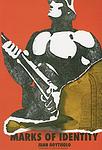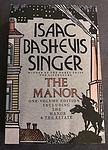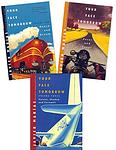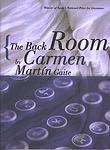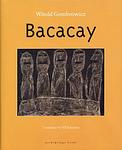The Greatest Polish, Spanish "Fiction" Books Since 1950
Click to learn how this list is calculated.
This list represents a comprehensive and trusted collection of the greatest books. Developed through a specialized algorithm, it brings together 300 'best of' book lists to form a definitive guide to the world's most acclaimed books. For those interested in how these books are chosen, additional details can be found on the rankings page.
Genres
Countries
Date Range
Reading Statistics
Click the button below to see how many of these books you've read!
Download
If you're interested in downloading this list as a CSV file for use in a spreadsheet application, you can easily do so by clicking the button below. Please note that to ensure a manageable file size and faster download, the CSV will include details for only the first 500 books.
Download-
1. Solaris by Stanislaw Lem
The novel is a psychological exploration of human limitations and failures set against the backdrop of space exploration. When a psychologist arrives at a research station orbiting a distant planet covered entirely by a sentient ocean, he discovers the crew in disarray, haunted by physical manifestations of their subconscious fears and desires. As he grapples with the ocean's inscrutable nature and its unsettling ability to materialize human thoughts, he is forced to confront his own guilt and regret, embodied by the apparition of his deceased wife. The story is a philosophical meditation on the impossibility of truly understanding alien intelligence and the painful isolation of the human condition.
-
2. The Shadow of the Wind by Carlos Ruiz Zafon
The novel follows the story of a young boy in post-war Barcelona, who discovers a mysterious book in a hidden library that his father takes him to, which houses forgotten books. The boy becomes captivated by the book and its author, but as he grows older, he realizes that someone is destroying all books written by this author. As he delves deeper into the mystery, the boy's life becomes intertwined with the author's, revealing a dark and tragic past that someone wants to be kept hidden. The story is a mix of romance, mystery, and a historical narrative set against the turbulent backdrop of a city recovering from war.
-
3. The Hive by Camilo José Cela
"The Hive" is a novel set in post-Civil War Spain, during the harsh years of Madrid's postwar recovery. It provides a gritty and realistic portrayal of the struggles faced by ordinary citizens in a society marked by deprivation and repression. The narrative is non-linear and fragmented, featuring a vast array of characters from various social classes, whose lives intertwine in a depiction of the bleakness and despair of the time. The book was initially banned in Spain due to its critical view of Franco's regime.
-
4. The Painted Bird by Jerzy Kosinski
"The Painted Bird" is a dark and harrowing novel set in Eastern Europe during World War II. The story follows a young, unnamed boy of unknown ethnicity who is sent by his parents to live in a remote village for safety. However, he is instead subjected to brutal violence, abuse, and superstition by the superstitious peasants. The book explores themes of survival, human cruelty, and the loss of innocence in the face of war and hatred.
-
5. A Heart So White by Javier Marías
The novel delves into the complexities of relationships, secrets, and communication as the protagonist, a translator and interpreter, grapples with the mysterious suicide of his father's first wife and the pervasive silence surrounding it. Through his own marriage and his observations of others', he contemplates the unsaid and the power of words, both spoken and unspoken. The narrative weaves through time and memory, exploring the impact of the past on the present and the intricate ways in which people understand and misunderstand each other.
-
6. The Time Of The Doves by Merce Rodoreda
The novel is a poignant exploration of a woman's life set against the backdrop of the Spanish Civil War and the early years of Franco's dictatorship. Through the eyes of the protagonist, a shopkeeper in Barcelona, readers experience her struggles with love, loss, and survival. Her personal journey is interwoven with the turbulent history of the era, as she endures the hardships of war, the complexities of her romantic relationships, and the challenges of raising her children alone. The narrative, rich with symbolic imagery, particularly the recurring motif of doves, offers a deeply emotional and intimate portrayal of resilience amidst the chaos of societal upheaval.
-
7. The Magician of Lublin by Isaac Bashevis Singer
This novel tells the story of Yasha Mazur, a talented and renowned 19th-century Jewish magician living in Poland. Yasha is a complex character, torn between his own desires and the expectations of his religious community. He leads a double life, juggling his career, his marriage, and his multiple affairs. As he grapples with his conflicting identities, Yasha is forced to confront his own moral failings and the consequences of his actions. His journey is one of self-discovery and redemption, offering a nuanced exploration of faith, love, and the human condition.
-
8. Gimpel the Fool by Isaac B Singer
"Gimpel the Fool" is a collection of short stories that portray the life of Gimpel, a simple baker who is often deceived by the people in his town. Despite the continuous deceit, Gimpel maintains his faith in humanity and never seeks revenge. Throughout the stories, the protagonist's innocence and naivety are contrasted with the harsh realities of the world, exploring themes of faith, forgiveness, and the inherent goodness of people.
-
9. The Futurological Congress by Stanislaw Lem
In a dystopian future, the protagonist attends a scientific conference where he is exposed to a new hallucinogenic drug that transports him to a surreal and chaotic world. As he navigates through this bizarre reality, he becomes entangled in a conspiracy involving mind-altering technology, political manipulation, and the struggle for power. This satirical novel explores themes of reality, identity, and the dangers of unchecked technological advancements.
-
10. The Club Dumas by Arturo Pérez-Reverte
The book follows Lucas Corso, a book detective who is hired to authenticate a rare manuscript by Alexandre Dumas. As he delves into the investigation, he finds himself entangled in a mystery involving two other books: a rare edition of "The Three Musketeers" and a satanic text, "The Book of Nine Doors of the Kingdom of Shadows". The narrative becomes a complex puzzle as Corso uncovers connections between the books, while also dealing with a seductive woman who seems to have stepped out of a Dumas novel, a mysterious killer, and a group of bibliophiles obsessed with Dumas. The lines between fiction and reality blur as he gets closer to the truth.
-
11. Bartleby & Co by Enrique Vila-Matas
"Bartleby & Co" is a metafictional work that explores the theme of "writers of the No," authors who cease to write or never start at all. The narrator, an office worker on sick leave, uses footnotes to a nonexistent text to delve into the stories of these authors, including famous real-life figures. The book serves as a meditation on silence, refusal, and the nature of literature itself.
-
12. Marks of Identity by Juan Goytisolo
This novel follows the life of Alvaro Mendiola, a Spanish man returning to his homeland after a long period of self-imposed exile in France. Through his experiences and memories, the narrative paints a vivid picture of the socio-political climate in Spain under Franco's dictatorship. As Alvaro grapples with his identity, the book explores themes of personal and national identity, exile, and the struggle for freedom.
-
13. Memoirs of a Peasant Boy by Xosé Neira Vilas
"Memoirs of a Peasant Boy" is a poignant narrative about the harsh realities of rural life in Galicia, Spain during the early 20th century, as seen through the eyes of a young boy. The protagonist, who is also the narrator, offers a vivid depiction of his experiences growing up in poverty, dealing with oppressive landlords, and struggling for survival and education. This autobiographical novel is a powerful commentary on social injustice and the enduring spirit of the human will.
-
14. The Manor by Isaac Bashevis Singer
"The Manor" depicts the complex interplay between Jews and Polish nobility in 19th century Poland. The narrative focuses on the lives of two Jewish families, the Kalinowskis and the Dembowskis, who are tied together by marriage. As they navigate the political and social changes of the time, the characters grapple with issues of faith, tradition, assimilation and the struggle for survival. The book provides a vivid portrayal of Jewish life in Poland during a period of significant change and upheaval.
-
15. Time of Silence by Luis Martín-Santos
"Time of Silence" is a complex narrative that follows the life of a young doctor living in Madrid during the Franco regime. Throughout the novel, he becomes embroiled in a series of unfortunate events, including an affair with a married woman, which leads to tragic consequences. The novel is known for its innovative narrative techniques and its critical depiction of the moral and political climate of Spain under Franco's rule.
-
16. Your Face Tomorrow: Fever and Spear by Javier Marías
The novel explores the life of a Spanish expatriate in England who is recruited by a secretive organization due to his unique ability to interpret people's behavior. As he becomes entangled in a world of espionage, he grapples with moral and ethical dilemmas, questioning the validity of his work and the consequences of his actions. Through a blend of introspective musings and suspenseful narrative, the protagonist's life unravels, revealing a complex web of deceit, betrayal, and violence.
-
17. Last Evenings with Teresa by Juan Marse
The novel revolves around a young, ambitious man from the lower class who is obsessed with breaking into the higher social strata of Barcelona. He believes that his ticket to this higher society is through seducing Teresa, a naive, young girl from a well-off family. As he manipulates Teresa, he finds himself entangled in a web of deceit, lies, and unexpected feelings. The story is a gritty exploration of class, ambition, and the lengths people will go to achieve their desires.
-
18. The Back Room by Carmen Martín Gaite
"The Back Room" is a surreal narrative that blurs the lines between reality and imagination. The story revolves around a female writer who is visited by a mysterious stranger in the middle of the night. The stranger triggers a series of memories and dreams, transporting her back to her childhood during the Spanish Civil War. As the protagonist delves deeper into her past, she begins to question the nature of her reality, resulting in a psychological exploration of memory, identity, and the power of storytelling.
-
19. Southern Seas by Manuel Vázquez Montalbán
"Southern Seas" is a detective novel set in post-Franco Barcelona. The story revolves around a private detective who is hired to investigate the mysterious disappearance of a wealthy man. As he delves deeper into the case, he finds himself entangled in a web of corruption, violence, and deceit, revealing a dark underbelly of the city's elite society. The narrative is deeply political and social, exploring themes of power, class, and the legacy of Franco's dictatorship in Spain.
-
20. Drive Your Plow Over the Bones of the Dead by Olga Tokarczuk
This novel centers around an eccentric woman living in a remote Polish village, who becomes embroiled in a series of mysterious deaths occurring in her community. As she investigates, she is drawn into a deeper exploration of nature, astrology, and the human psyche, all while navigating the dismissive attitudes of the local law enforcement. The narrative is a blend of dark comedy, philosophical inquiry, and mystery, with a strong underlying commentary on animal rights and environmentalism.
-
21. Bacacay by Witold Gombrowicz
"Bacacay" is a collection of darkly humorous and surreal short stories that delve into the absurdities of human behavior and social norms. The tales are set in a variety of locations and time periods, featuring a cast of eccentric characters who find themselves in bizarre and often grotesque situations. Through sharp wit and a playful manipulation of language, the stories satirize the pretensions and follies of society, challenging the reader's perceptions of reality and the boundaries of conventional storytelling.
-
22. Larva: Midsummer Night's Babel by Julián Ríos
"Larva: Midsummer Night's Babel" is a complex and innovative novel that explores the nature of language and the power of words. It's a narrative labyrinth that follows a group of characters through the streets of London on a midsummer night, as they engage in a series of intellectual debates and discussions. The story is filled with puns, word games, and literary references, and is written in a unique style that blends poetry and prose. The novel is also a satire of the literary world, with the characters often critiquing and parodying various literary styles and authors.
-
23. The Beautiful Mrs. Seidenman by Andrzej Szczypiorski
Set in Nazi-occupied Warsaw, the novel tells the story of Mrs. Seidenman, a blonde, blue-eyed Jewish widow who is arrested by the Gestapo. The narrative revolves around the eclectic group of characters in her life, including a young man who is in love with her and a lawyer who is determined to save her. The book provides a vivid and poignant depiction of life under Nazi rule, exploring themes of survival, resistance, and the resilience of the human spirit.
-
24. Trans Atlantyk by Witold Gombrowicz
"Trans Atlantyk" is a semi-autobiographical novel that explores the author's experiences as a Polish writer living in Argentina during World War II. The book delves into themes of identity, language, and cultural displacement, as the protagonist navigates the challenges of being an outsider in a foreign land. With a blend of humor and introspection, the novel offers a unique perspective on the complexities of exile and the struggle to maintain a sense of self in unfamiliar surroundings.
-
25. Obabakoak by Bernardo Atxaga
Obabakoak is a collection of interconnected stories that revolve around the inhabitants of a fictional Basque village named Obaba. The stories, which are a blend of the magical and the everyday, explore the complexities of human nature, as well as the rich history and culture of the Basque region. Themes of love, fear, tradition, and change are woven throughout, offering a nuanced and evocative portrait of a community and its people.
Reading Statistics
Click the button below to see how many of these books you've read!
Download
If you're interested in downloading this list as a CSV file for use in a spreadsheet application, you can easily do so by clicking the button below. Please note that to ensure a manageable file size and faster download, the CSV will include details for only the first 500 books.
Download










